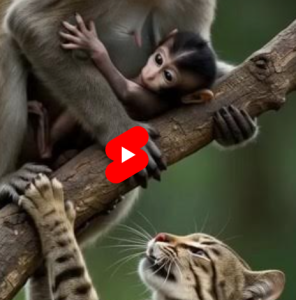
Another important aspect of baby monkey-friendly practices is proper medical care. Baby monkeys, especially those in captivity or rehabilitation, require routine health checks to monitor their growth and detect any signs of illness early. Veterinary staff must be trained in primate-specific medicine, as these animals can suffer from a range of diseases, including respiratory infections, parasites, and nutritional deficiencies. Preventative care, such as vaccinations and parasite control, also plays a critical role in ensuring a healthy start to life.
Enrichment is vital to the mental and emotional development of baby monkeys. A baby monkey-friendly environment includes daily activities that stimulate natural behaviors like foraging, climbing, and problem-solving. Simple tools such as puzzle feeders, tree branches, and swinging ropes can provide both fun and cognitive challenges. Enrichment not only keeps baby monkeys mentally active but also helps prevent boredom, which can lead to stress and self-harming behaviors.
The role of caretakers and staff in baby monkey-friendly settings cannot be overstated. These individuals need not only technical knowledge but also deep empathy and patience. Gentle handling, consistent routines, and positive reinforcement techniques help foster trust and reduce fear. In the best environments, staff members become surrogate figures who support, rather than dominate, the baby monkeys’ development.
Public education is another cornerstone of the baby monkey-friendly philosophy. Whether in zoos, sanctuaries, or online platforms, it’s important to educate visitors and audiences about the challenges baby monkeys face in the wild and captivity. By understanding the impacts of the exotic pet trade, deforestation, and illegal wildlife trafficking, people are more likely to support responsible conservation efforts and avoid behaviors that exploit these vulnerable animals.
In addition, partnerships between local communities and conservation organizations are essential for creating truly baby monkey-friendly regions. In many parts of the world, habitat loss due to agriculture or development places baby monkeys at risk. Initiatives that involve local communities in habitat protection, wildlife monitoring, and sustainable tourism can create economic incentives that align with conservation goals. When communities benefit from protecting wildlife, baby monkeys have a greater chance of survival.
Finally, long-term research and data collection are vital to refining what it means to be baby monkey friendly. Behavioral studies, health records, and rehabilitation outcomes all contribute to a growing body of knowledge that helps refine care standards and reintroduction techniques. Scientific insights guide ethical decisions, improve care practices, and ultimately ensure that baby monkeys receive the best possible support from infancy to adulthood.